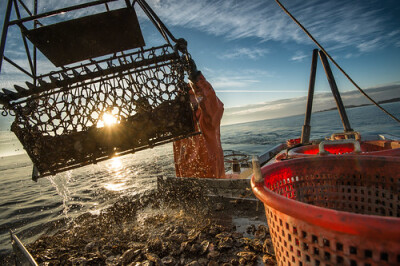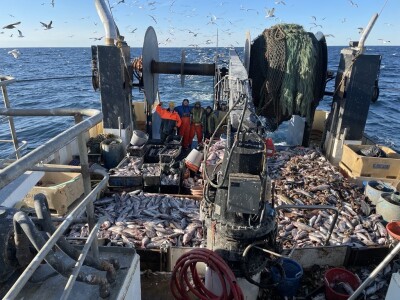The New England cod fishery has existed for hundreds of years, lasting through many major swings in landings.
Yes, this is the lowest we've ever "seen" the biomass (insofar as our limited data allows us to see), but this is also the warmest we've seen the water and the most dogfish we've had to contend with.
Fishing effort has been severely curtailed for more than 20 years, every year with the promise that someday soon, the sacrifices of the fleet will be worth it. And make no mistake, this fleet has made sacrifice after sacrifice, apparently to no avail. If the cod stock gets more and more dire every year, it's not because we have been fishing them rapaciously. It's because the circumstances for their return are not optimal and even worse, they are apparently beyond human control.
Cod landings hit a low very close to what we're seeing now during a 20-year period between 1950 and 1970.
That was also a time when huge foreign fleets parked offshore and scooped up as much fish as they could carry home across the oceans. Few people mention the effects this might have on the long-term sustainability of the stock.
After the Magnuson Act pushed them off of Georges and out of the Gulf of Maine, U.S. landings increased again. Then dipped for a while, then increased again and are dipping again.
We are not fools for wanting to be sure the cod returns. What makes us foolish is the notion that we can somehow trick nature into doing our bidding just because we want it badly enough.
Some say the best option, as we keep a narrow-minded focus on "how we've always done things," may be to shut down the industry for a full year. We could try to think outside the conference room on this, but I doubt we will. As of now, it appears that we will indeed allow the ports and infrastructure to shrivel up and go the way of the vacation condo and law firm.
We'll let our 400-year-old industry drift into the fog instead of using all the tools in our arsenal to chart a clear course for the future of the fleet, allowing fishermen to pursue redfish and other healthy populations in the 15-fish complex that is New England groundfish. And then, after we've thinned out the dogfish population a little (a necessity as a result of our self-imposed protections) and the water cools again, thanks to Mother Nature, we'll pat ourselves on the back for having saved the cod.
Then we'll look around for someone to go fish for it, find one or two fishing conglomerates that amassed enough quota to make money on what little fish they were allowed to land, and wonder why it's so expensive to buy local fish.
Welcome to the short-sighted future. This is what happens when you think you're watching out for the long term, steaming full ahead, secure in your course. But the surprise attack comes from the side.






